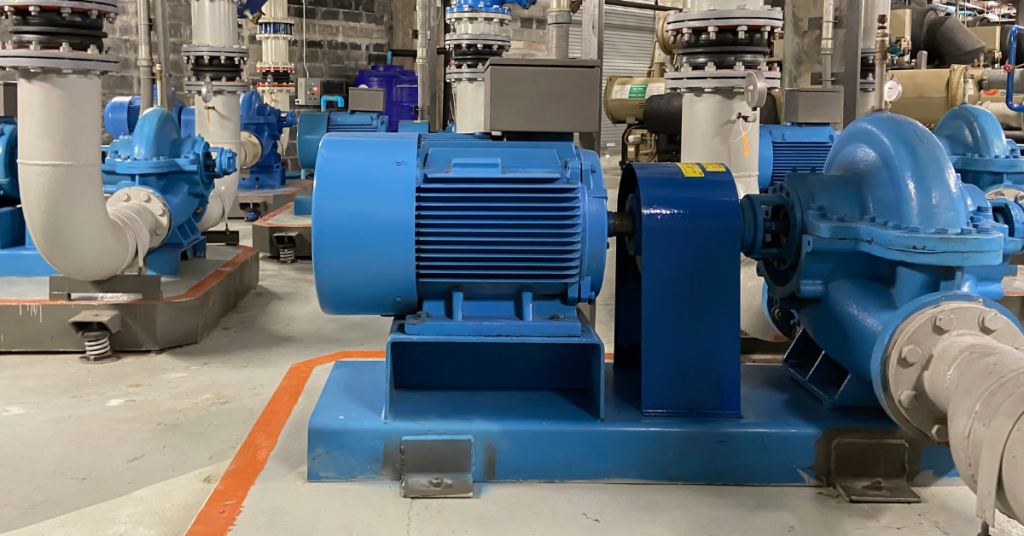Compressors play a vital role in industrial refrigeration systems, serving as indispensable components. As time passes, both compressors and their bearings undergo degradation, posing a potential threat of facility downtime and consequent negative impact on your financial performance. To guarantee the consistent and efficient operation of this equipment, the implementation of a rigorous maintenance program becomes imperative.
Staying on top (or even ahead) of maintenance will prolong the compressor’s life and avoid a shutdown. In fact, 82% of manufacturing companies have experienced unplanned downtime, costing as much as $260,000 an hour, according to one study.
Here are five common oversights we often encounter when inspecting and repairing refrigeration compressors:
Oversight #1: Sampling oil immediately after running the machine
Oil plays a large part in the life of an industrial refrigeration compressor. It’s essential to follow manufacturer guidelines and choose the correct oil for the machine. More importantly, owners should sample oil to monitor the oil’s condition and note any harmful contaminants detected. If a compressor is running with compromised oil, it could corrupt the entire machine and prompt a replacement.
Remedy: When sampling oil, employees should let the oil run for 60 to 90 seconds before taking a sample. Immediately sampling the oil will tamper with results and provide a false reading from iron seeping into the oil when the faucet is opened. Letting it run first is like flushing the line out to ensure an accurate reading.
Oversight #2: Conducting vibration analysis in different locations on the compressor
Vibration analysis is the process that monitors the levels and patterns of vibration signals within the compressor to ensure it is performing as expected. When conducting vibration analyses, a reading will be inaccurate if repeatedly measured at different locations on the compressor.
Remedy: Always set your accelerometer at the same spot to promote consistent readings. Owners can place a sticker at the vibration points to ensure the accelerometer is always mounted in the same spot, no matter who is measuring it.
Oversight #3: Not following instructions regarding bearing end play
Bearing end play refers to the amount of axial movement, or play, that exists between the two bearings supporting a rotating shaft in a refrigeration compressor. Bearing end play must be carefully controlled for the shaft to rotate smoothly without excess axial movement — which could cause damage to the bearings, seals, or other machine components — and speed up the need for a replacement. To maintain proper bearing end play, owners may need to adjust the components between the bearings and the shaft. This clearance varies from part to part.
Remedy: Following original equipment manufacturer (OEM) procedures is critical. When it comes to bearing end play and parts, one size does not fit all and, in the long run, failing to follow instructions can result in false readings. A situation could appear worse than it is, or there could be a false negative that seems to be not an issue when, in reality, there could be a significant problem awaiting.
Oversight #4: Failing to consider all factors in compressor alignment
Alignment is critical in an industrial refrigeration compressor to prevent excessive wear and tear on the compressor’s components. It is essential to ensure that any rotating components, such as the compressor’s crankshaft and motor shaft, are properly positioned. Misalignment can also cause the compressor to operate at less-than-optimal efficiency, increasing energy consumption and operating costs.
Two additional factors involved in misalignment are dial indicator sag and dial indicator hysteresis. When aligning a machine, technicians should consider indicator sag. If a coupling is rotated upside down, gravity can potentially cause it to sag. While that slight discrepancy doesn’t necessarily need to be fixed, it does need to be factored into a reading.
Remedy: Measuring the sag is a best practice every time a measurement is taken. It’s essential to factor the sag (typically thousandths of an inch, but it can vary) into any readings.
Oversight #5: Taking a dial indicator measurement without factoring in hysteresis
Dial indicator hysteresis is the difference in readings from a dial indicator when it is moved from one direction to the opposite direction, often caused by its mechanical design. While a dial indicator is mechanical, even if it is fully clamped, the needle could still shift. The effect of hysteresis can lead to inaccurate measurements if not considered appropriately.
Remedy: To minimize the impact of hysteresis on the accuracy of the readings, technicians may need to perform several measurements in different directions and take an average to obtain a more accurate reading. We also recommend recalibrating the dial indicator at least once a year to the National Institute of Standards and Technologies (NIST) set points.
Preventive maintenance is the key
While many owners may want to complete maintenance only when it is absolutely necessary, minor problems can add up quickly and cascade into several other issues. Premature bearing wear, motor failures or seal leaks could create more issues over time. It’s not just mechanical failures; the area around the machine could also become inaccessible, triggering facility-wide delays or downtime. All parts of a compressor work together, so it’s vital to protect all aspects when completing maintenance.
Consider conducting an audit of your industrial refrigeration system and compressors at least once a year to avoid pitfalls. A maintenance partner, such as Stellar, can review the system and, over time, understand what has been completed and what needs to be done.
What components should be reviewed?
- Relief valves (these have a stamped expiration date, about every five years)
- Microprocessor
- Temperature probes
- Transducers
- Oil pumps
- The motor itself
- All the hold-down bolts for the package
- Pipe stress
Facility leaders interested in an inspection can work with Stellar’s experienced team to adequately determine the oversights in their compressor maintenance — and how to combat them. In addition to extending the life of the compressor, regular servicing allows maintenance personnel to detect issues early and take corrective measures to prevent costly repairs in the future.
Have questions about compressor maintenance? Email us at foodforthought@stellar.net or give us a call at 800.488.2900.



